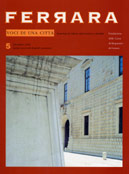He was a powerfully built forty-three years old of imposing stature with a massive head and a wide brow topped by sparse hair. With an athletic stride he stepped up to his desk and it was only after a few seconds that he bade us sit down with a peremptory gesture. In total silence we noted with wonder that he laid three or four newspapers on the desk, including a French daily. He had a deep voice that every so often would become sharper and more tenuous, with a vaguely sarcastic inflection.
When, as we observed later, he didn't think it sufficient to call us "mister" he would add a pompous "Sir". Sometimes, as an aid to irony, he would amuse himself by transforming our names into Latin: Calzolari became Calzolarius, Cavallari, Cavallarius, Galloni, Gallonius, and so on.
«Mr Calzolarius, are you ready to be examined, Sir?» he would ask Franco Calzolari, who was to become a noted barrister in Ferrara: from his place Calzolari would shrink down and try to make himself look smaller.
«Well then, Mr Calzolarius, have you studied the orations of Demosthenes or not?»
Calzolari would make a grimace as if to say: «Well... sort of...so-so...»
A chilling alternative was handed down from on high: «You decide Mr Calzolarius: would you prefer to be examined now or remain in your seat with an E? Because, should you prefer not to be examined, I'll put an E down in the register.» Calzolari, rather than accept certain failure, would try his luck; but it wasn't easy to score more than the E reserved for those who opted for silence.
Often, to make us understand that we should always stay on our toes, he would examine the same student for three or four days running. Once he even went as far as examining one of us for nine days straight: «This way none of you gentlemen will cherish any illusions in future», he commented in the end.
A justification for such exaggerated severity may be found, not so much in the customs of those days, as in the intransigence with which Francesco Viviani kept faith with his ideals and, above all, in his extraordinary professional commitment.
He would use readings of Demosthenes, Horace, and Tacitus as platforms from which to criticize the dictatorship and to extol liberty. When he read the Annals in Latin, at the point where Tacitus emphasizes the shortcomings and faults of Augustus - Dicebat contra... - he would thump his fist on the desk, his voice would grow louder, begin to thunder, and the glass of the big windows would shake. The same thing would happen with his favourite poet, Horace, especially when he came to the famous Integer vitæ scelerisque purus - he who has led a life of integrity, without stain, is afraid of nothing and no one - si fractus dilabatur orbis, impavidum ferient ruinæ - even if the world were shattered to smithereens, he would stand fearless amid the ruins.
How our teacher would light up at these words! He seemed ready, if not to face the collapse of the entire world, at least that of the ex-convent in which our school stood. He wanted us not only to love the Latin and Greek poets, but all of the classical world, which was to serve as a source from which we could draw an understanding of the great concepts of liberty, justice and homeland. But our class was not to continue enjoying his presence throughout high school. At the end of the second year, the victim of one of the many measures taken by the Ministry in a bid to subdue his opposition, he was transferred from Ferrara to Sciacca, in Sicily. We never heard any more of him.
Only after the end of hostilities were we informed of his political activity: a leader in the clandestine Partito d'Azione, the chairman of the Verona branch of the Comitato di Liberazione Nazionale, he was arrested on the 2nd of July 1944 and thereafter sent to Buchenwald, where he died just before the camp was liberated. The last picture of him, taken in the camp, shows a species of skeleton dressed in a striped smock, exhausted, leaning with eyes closed against the shoulders of another prisoner.
Many have paid tribute to his memory, but we, his pupils, could hardly do better than borrow the words that Giorgio Bassani wrote him when he learned of his forced transfer to Sicily: ''In this distressing moment, I am glad to recall these fine qualities of yours, all the more so because it was above all those same qualities that made me a man, in the fullness of a spirit open to all beauties, open to all that is noble; a man, in the boundless love that leads to freedom and justice".



